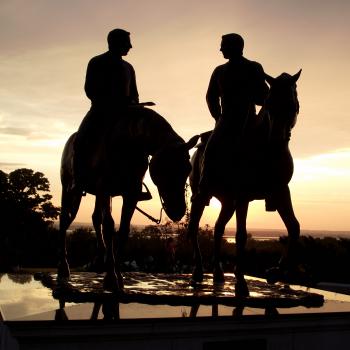These are the ones that people most often write and talk about when speaking of the Maxims, but there are actually 147 of them (or possibly more -- we have currently discovered 147 of them). They were designed to help someone become Greek, to define "Greekness" within an expanding world that was admitting non-Greeks into the fold. These Maxims were used to teach children and adults alike how to read and write in Greek, but also how to think as a Greek. They're made up of short, pithy sentences and use many interesting words that would have been common at the time. There are actually University teachers using the Maxims as a method of teaching people to speak and write ancient Greek now.
For me, the Maxims are a way of exploring my spirituality and my beliefs. They are intellectual, not easily understood, and require a lot of thought. They are not ‘dumbed down' in any way, and indeed are often contradictory (at least on the surface). In other words, they challenge me to examine and grow within my beliefs.
When I was working on Longing for Wisdom, I wrote all 147 Maxims onto little cue cards on a chain, and I would carry them around with me. When I was feeling confused or unsure, I would pull the cards out and pore through them, looking for wisdom or inspiration. I still have those cards, and still refer to them from time to time. They contain the wisdom of the ages, and retain the ability to get me moving when I feel stalled. There are even times when I pull out my little cards and choose one at random, taking the result as a sort of miniature oracle for my day. I find this a very fulfilling practice!
What prompted you to write this book?
When I began my investigation into the Maxims, I started by writing about a particular one in my journal. I would explore how it applied to my life, and what it meant to me both historically and in a modern sense. Sannion (the original founder of Neos Alexandria) suggested that it would be a decent book if I fleshed it out, and I agreed. I began a much more in-depth exploration of the Maxims, did hours of research at the local university library, and submerged myself in them. What came out was Longing for Wisdom, a sort of Hellenic Frankenstein! Pieced together with Maxims of the past, the threads of the present time hold it together, and it gives the future something to work from.
Who or what has had the strongest influence on your spiritual work?
I would have to say that the gods themselves are who challenge and influence me the most. I have been lucky enough to have a lot of personal contact (UPG or Unverified Personal Gnosis) with the gods I connect with most. At moments when I have faltered, if I find myself able to ask for help of them, my way is made clear. Sometimes help comes in human guise, sometimes in a dream, or a vision, or a tarot reading. I try to keep my eyes and ears open to whatever voice the gods choose to use.
What do you perceive to be the greatest challenges facing the Hellenic Pagan in adapting these maxims for contemporary devotion and/or spiritual life?
I think that we've lost touch with what myth means! When we read the Maxims, they give us direction that is moral and ethical, but without mention of the gods except as a subject (for instance, the Maxims "Worship the Gods" and "Follow God"). Most of them don't refer to the gods at all. The Maxims were meant to be a part of a larger framework, not stand-alone ethics to be referred to in difficult times. They are meant to encapsulate the basics of Greek thought, and that includes a rich and strong mythological background. We can't look at the Maxims and not also study the myths that come from the same place and time.
Even more importantly, we need to understand that the Maxims and the myths of ancient Greece were products of their time. That time is long gone, and we need to extract the meat of it, and bring it into the new world. The Greeks were not static; they existed across a thousand years and countless city-states. There was no single Greek rule or Greek belief. We often refer to calendars and beliefs from Athens, because it is convenient for us, but we must never fall into the trap of believing that "is Greece."
In short, we need to make the Maxims and the myths mean something to us, now. We live in 2010, and we live in many countries around the world. I live in North America, and when I read the Maxims I have to understand them both in their Greek context, and in the context of 2010 America.
You talk briefly in the introduction to Longing for Wisdom about the possible need to update our mental images of the Greek Gods (and I love the re-imagined Hermes in a business suit with a Blackberry ruling over contemporary communication!). How has this idea been received within the greater Hellenic Pagan community?





